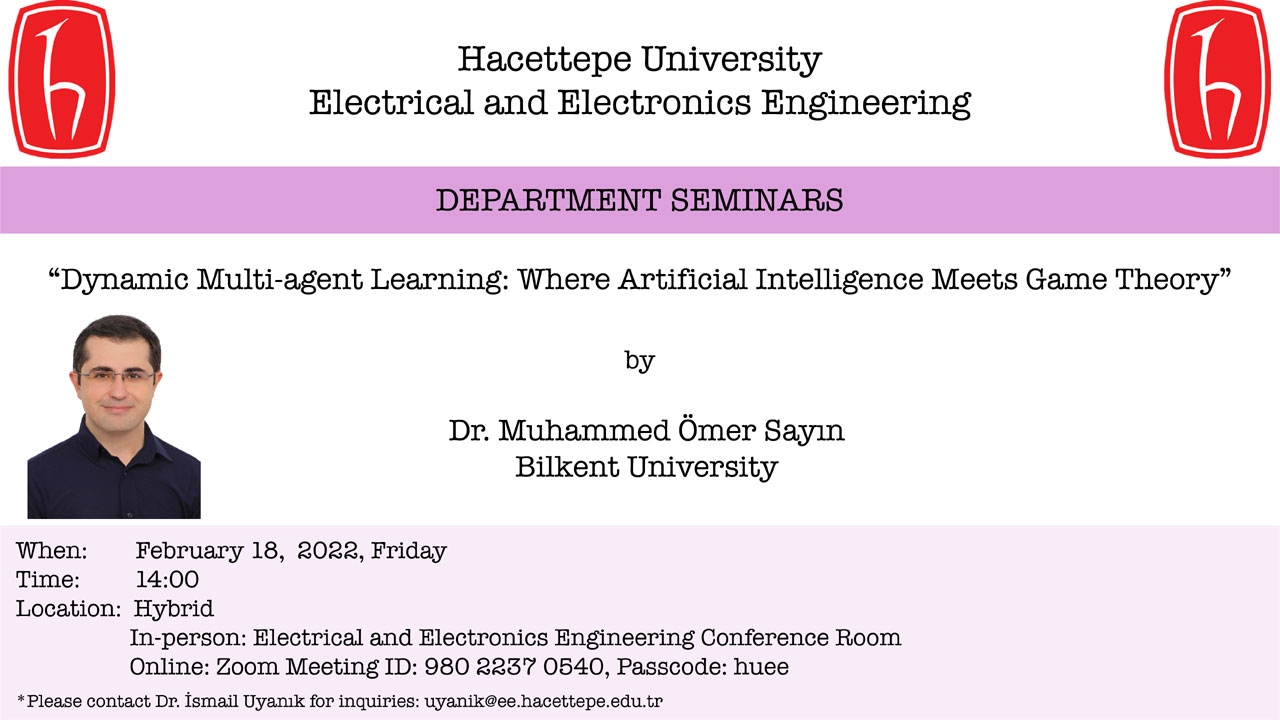Announcements
February 14, 2022
Within the department's seminar series of 2021-2022 Spring Term, Dr. Muhammed Ömer Sayın from Bilkent University will make a talk titled "Dynamic Multi-agent Learning: Where Artificial Intelligence Meets Game Theory".
For your questions and comments:
Dr. İsmail Uyanık, uyanik@ee.hacettepe.edu.tr
Seminar Date : Friday, February 18, 2022
Seminar Time : 14:00 (Turkey local time)
Seminar Place : in person and Zoom
Zoom id and passcode is on the image.
For your questions and comments:
Dr. İsmail Uyanık, uyanik@ee.hacettepe.edu.tr

ABSTRACT
Reinforcement learning (RL) has recently achieved tremendous successes in many artificial intelligence applications. Many of the forefront applications of RL involve multiple agents, e.g., playing chess and Go games, autonomous driving, and robotics. Unfortunately, the framework upon which classical RL build is inappropriate for multi-agent learning, as it assumes an agent’s environment is stationary and does not take into account adaptivity of other agents. Therefore, Markov games (also known as stochastic games) are an ideal model for (decentralized) multi-agent reinforcement learning applications by modeling the interactions among human-like intelligent decision-makers in dynamic environments.
In this talk, I present a simple and independent learning dynamics for Markov games. It is a novel variant of fictitious play combining the classical fictitious play and Q-learning within two-timescale learning scheme. There has been limited progress on developing independent learning dynamics with systematic convergence guarantees. I will show that the presented dynamics converge almost surely to an equilibrium in certain but important classes of games such as zero-sum and (single-controller) identical-payoff Markov games. The results could also be generalized to the cases where players do not know the model of the environment, do not observe opponent actions and can use heterogenous learning rates. I will also discuss my future research agenda directed towards developing theoretical and algorithmic foundation of learning and autonomy in complex, dynamic and multi-agent systems.
BIOGRAPHY
Muhammed Omer Sayin is an Assistant Professor at Bilkent University, Department of Electrical and Electronics Engineering since September 2021. He was a Postdoctoral Associate at the Laboratory for Information and Decision Systems (LIDS), Massachusetts Institute of Technology (MIT), and advised by Asuman Ozdaglar from September 2019 to August 2021. He got his Ph.D. from the University of Illinois at Urbana-Champaign (UIUC) in December 2019. His advisor was Tamer Başar. During his Ph.D., he had two research internships in Toyota InfoTech Labs, Mountain View, CA. He got his M.S. and B.S. from Bilkent University, Turkey, respectively, in 2015 and 2013. The overarching theme of his research is to develop the theoretical and algorithmic foundation of learning and autonomy in complex, dynamic and multi-agent systems.
Reinforcement learning (RL) has recently achieved tremendous successes in many artificial intelligence applications. Many of the forefront applications of RL involve multiple agents, e.g., playing chess and Go games, autonomous driving, and robotics. Unfortunately, the framework upon which classical RL build is inappropriate for multi-agent learning, as it assumes an agent’s environment is stationary and does not take into account adaptivity of other agents. Therefore, Markov games (also known as stochastic games) are an ideal model for (decentralized) multi-agent reinforcement learning applications by modeling the interactions among human-like intelligent decision-makers in dynamic environments.
In this talk, I present a simple and independent learning dynamics for Markov games. It is a novel variant of fictitious play combining the classical fictitious play and Q-learning within two-timescale learning scheme. There has been limited progress on developing independent learning dynamics with systematic convergence guarantees. I will show that the presented dynamics converge almost surely to an equilibrium in certain but important classes of games such as zero-sum and (single-controller) identical-payoff Markov games. The results could also be generalized to the cases where players do not know the model of the environment, do not observe opponent actions and can use heterogenous learning rates. I will also discuss my future research agenda directed towards developing theoretical and algorithmic foundation of learning and autonomy in complex, dynamic and multi-agent systems.
BIOGRAPHY
Muhammed Omer Sayin is an Assistant Professor at Bilkent University, Department of Electrical and Electronics Engineering since September 2021. He was a Postdoctoral Associate at the Laboratory for Information and Decision Systems (LIDS), Massachusetts Institute of Technology (MIT), and advised by Asuman Ozdaglar from September 2019 to August 2021. He got his Ph.D. from the University of Illinois at Urbana-Champaign (UIUC) in December 2019. His advisor was Tamer Başar. During his Ph.D., he had two research internships in Toyota InfoTech Labs, Mountain View, CA. He got his M.S. and B.S. from Bilkent University, Turkey, respectively, in 2015 and 2013. The overarching theme of his research is to develop the theoretical and algorithmic foundation of learning and autonomy in complex, dynamic and multi-agent systems.
More announcements

